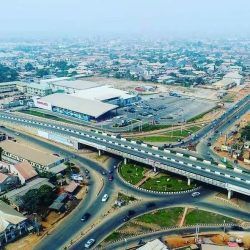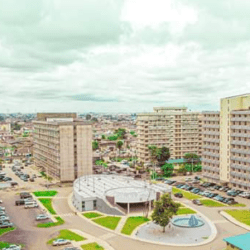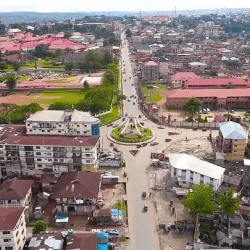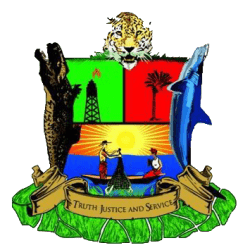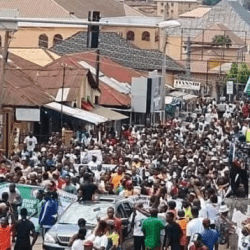
Administration
Administratively, the Hon. House is headed by the Clerk of the House, a position equivalent to Permanent Secretary in the State Civil Service. The Clerk is assisted by the Deputy Clerk of the House {Ministerial Secretary’s equivalent} with 7 other coordinating Directorates. The Directorates includes Administration and Supplies; Legislative Processing; Legal Service; Finance and Accounts; Planning, Library and Computer Statistics; Information and Publication and Legislative Budget and Research Office.
House Committees
To achieve these legislative goals, the Hon. House is divided into Standing and Special Committees. The Committees serves as branches of the Hon. House, overseeing the activities of Ministries, Departments and Agencies {MDAs}. The House Committee is headed by a Chairman, two members and Secretaries.
The Assembly Building
The present Borno State House of Assembly complex was inherited from the Native Authority and is the only legislative complex since the first republic. While sourcing a suitable location for the construction of new Assembly Complex by the Professor Baba Gana Umara Zulum’s administration, the complex has received a befitting renovations to provide conducive working environment for the legislature. The deliberative chamber has been remodeled with state of the art furniture and equipment
It is expected that with the crop of committed parliamentarians, the 9th Assembly will leave no stone unturned in rebuilding Borno State through people oriented legislation.

First and Second Legislative Assemblies
The Borno State House of Assembly was first inaugurated in October, 1979 with late Hon. Ibrahim Damagum of Fune East Constituency as Speaker with seventy {70} other Hon. Members for four {4} years October, 1979 to October, 1983 {1st Assembly}. During this period, Great Nigeria People’s Party {GNPP} controlled the House as Majority Party while the National Party of Nigeria {NPN}, People’s Redemption Party {PRP} and Unity Party of Nigeria {UPN} as minority parties.
At the end of the 1st Assembly, another set of Legislators were ushered-in in October, 1983 for the 2nd Assembly with NPN as Majority party. The House then elected late Hon. Bukar Mele Masu from Masu Constituency of Konduga Local Government Area as Speaker and late Hon. Bulama Jagamu Amshi from Bade Central Constituency as Deputy Speaker respectively. Due to military intervention in the nation’s polity in December, 1983, the House did not live to the legislative period of four years, hence it demised prematurely.
Legislative Department
As part of General Ibrahim Badamasi Babangida’s Transition to Civil Rule Programme in 1989, Legislative Department was curved out of the then Military Governor’s Office to enable put things in place for the successful take off of the Third Assembly. Alhaji Baba Geidam Mai was appointed as Clerk Designate with core legislative staff and successfully inaugurated the 3rd Assembly on 2nd January 1992.
Third Assembly
The two Party-Systems which practiced during the aborted Third Assembly were Social Democratic Party {SDP} and National Republican Convention {NRC}. Out of the forty-two {42} constituencies of the state, SDP controlled the House as Majority Party producing three different Speakers at different occasions which included Hon. Tijjani Bakomi {Yerwa Constituency}; Hon. Bukar Kachallah {Old Maiduguri Constituency} and Hon. Modu Aishami {Mobbar East Constituency} respectively until 17th November, 1993 when there was another military intervention in the Nigerian polity which abruptly derailed the Transition.
General Sani Abacha Transition Programme
In 1997, there was another state Assembly election which could not see to its inauguration due to the death of late General Sani Abacha who lined up that transition. Those elected were on the platforms of United Nigeria Congress Party {UNCP} and Grassroot Democratic Movement {GDM}. For the first time, the election produced three {3} female members from Maiduguri Metropolitan, Gwoza and Nganzai Constituencies
Fourth Assembly
After the demised of General Sani Abatcha, Major General Abdulsalami Abubakar lined up a nine {9} months Transition Programmes, new political parties were registered and successfully ushered in the Fourth Republic on 29th May, 1999 with president Chief Olusegun Obasanjo as president on the platform of the People’s Democratic Party {PDP}..
On 6th June, 1999, 28 Honourable Members were inaugurated for the 4th Assembly {6th June 1999 – 2nd June 2003}. The then Hon. Members were elected on the platforms of the All People’s Party {APP} and People’s Democratic Party {PDP} with APP controlling the House. During the inauguration, Hon. Bulama Fugu Ibrahim {APP} from Abadam and Hon. Musa Inuwa Kubo {APP} from Shani Constituencies were elected as Speaker and Deputy Speaker respectively.
On 14th August, 2002, Hon. Bulama Fugu Ibrahim was impeached and Hon. Musa Inuwa Kubo, then Deputy Speaker was elevated to Speaker and Hon. Ibrahim Lawan Umar {APP} from Mobbar Constituency was elected as Deputy Speaker until 2nd June, 2003 when the tenure of the 4th Assembly came to an end.
Fifth Assembly
The 5th Assembly {June 2003 – June 2007} was also inaugurated on 6th June, 2003. Twenty Eight {28} Hon. Members subscribed to Oath of Office and Allegiance after electing Hon. Abba Ali Mangal {ANPP} Monguno Constituency and Hon. Musa Inuwa Kubo {ANPP} Shani constituency as Speaker and Deputy Speaker respectively. After six {6} months of their inauguration as Presiding Officers of the House, Hon. Abba Ali Mangal and Hon. Musa Inuwa Kubo resigned their appointments on 21st October, 2003.
Late Hon. Asheikh Hurso Bashir {ANPP}, Marte Constituency was unanimously endorsed and elected as Speaker and Hon. Bello Ayuba {ANPP} from Bayo Constituency as Deputy Speaker of the House. Not comfortable with the challenges of the office, Late Hon. Asheikh Hurso Bashir resigned voluntarily as Speaker on 29th October, 2003. Hon. Sheikh’s resignation ushered in Hon. Goni Ali Modu {ANPP}, Abadam Constituency as the Speaker from 29th October, 2003 to 2nd June, 2007 when the 5th Assembly was formerly closed.
Sixth Assembly
Wednesday, 6th June, 2007 saw the inauguration of the 6th Assembly and again re-elected Hon. Goni Ali Modu as Speaker for the whole legislative seasons of the 6th Assembly. The 6th Assembly {June 2007 – May, 2011} has no opposition political party. All Hon Members were elected on the platform of All Nigeria People’s Party {ANPP} in a landslide victory.
Seventh Assembly
The 7th Assembly was also inaugurated on 6th June, 2011 and re-elected for the third time Hon. Goni Ali Modu as Speaker. He was the Speaker of the Hon. House until his impeachment on 9th February, 2012. Hon. Abdulkarim Lawan {APC}, Guzamala State Constituency was then elected as Speaker of the House till 2nd June, 2015 when the Assembly was formerly closed.
Eight Assembly
The 8th Assembly was inaugurated on Monday, 8th June, 2015 after receiving Proclamation from the Executive Governor of Borno State, Hon. Kashim Shettima and Writ from the Independent National Electoral Commission {INEC}.
As usual, the inauguration saw the election of Principal Officers of the House. Rt. Hon. Abdulkarim Lawan was unanimously elected as Speaker of the House Speaker for the second time. Other Principal Officers elected during the inauguration included Hon. Inusa Danlami Kubo {Shani} as Deputy Speaker; Hon. Mohammed Alhaji Zakariya Gajibo {Dikwa} as Leader; Hon. Baba Ali Modu {Mafa} as Whip; Hon. Ayuba Stephen Wakawa {Hawul} as Deputy Leader and Hon. Audu Mustapha {Magumeri} as Deputy whip respectively.
On 5th January, 2017, Hon. Mohammed Zakariya and Hon. Ayuba Stephen Wakawa resigned their appointments as Leader and deputy leader respectively. Consequently, Hon. Dige Mohammed {Kala Balge} and Hon. Zanna Aimu Foni {Chibok} were elected as Leader and deputy leader. The 8th Assembly was also formerly closed after four {4} consecutives legislative sessions on 8th June, 2019.
9th Assembly
The 9th Assembly, which is termed as “People Oriented Parliament” was inaugurated on Monday, 13th June, 2019, again electing Rt Hon. Abdulkarim Lawan {Guzamala} as Speaker and Hon. {Engr} Abdullahi Musa Askira as Deputy Speaker respectively. All other Principal Officers retained their positions as follows:-
- Hon. Dige Mohammed Kala Balge Leader
- Hon. Baba Ali Modu Mafa Whip
- Hon. Aimu Foni Chibok Deputy Leader
- Hon. Audu Mustapha Magumeri Deputy Whip
Borno State House of Assembly Service Commission
A statutory body known as the Borno State House of Assembly Service Commission was established pursuant to Assembly Service Commission Law, 2005 {also amendment in 2011}. The Commission is headed by a Chairman with three {3} Permanent Commissioners, two ex-officio and a Secretary.
The Commission is responsible for the recruitment, training, discipline of the staff of the Borno State House of Assembly and Local Government Legislative Staff which is the case in all states of the Federation including the National Assembly, Abuja.
Hon. {Engr} Abdullahi Musa Askira, Hon. Umar Kaigama {Yarema}, late Hon. Ali Darni Abba Saleh and Alh Musa A. Gwoma were the pioneer Chairman and members of the Commission appointed for four {4} years on 12th September, 2011. Hon. Abdullahi Musa Askira voluntarily relinquished his position on 9th December, 2014 while tenures of other Members of the Commission expired on 12th September, 2015.
At the exit of the pioneer Chairman, Hon. Ibrahim Audu Mirnga was appointed as Chairman of the Commission on 24th December, 2014 while Hon. Umar Kaigama {Yarema}, late Hon. Ali Darni Abba Saleh and Hon. Ibrahim Sani were appointed as members for another four years. Hon. Ali Darni Abba Saleh died while in Service on 27th February, 2017. The Commission has four {4} Directorates of Administration and Supplies; Finance and Accounts; Planning, Research and Statistics; Appointment, Promotion, Discipline and Complaints.
Borno
Borno is a state in Nigeria.
It’s one of the six states that form the North-East geopolitical zone of Nigeria.
Borno shares international borders to the North with Niger and Chad as well as with Cameroon to the East. Its Southern and Western borders are shared with Adamawa, Gombe and Yobe States. Maiduguri is the state capital.
State capital: Maiduguri
Local Government Areas: 27
Landmass: 57,798.1 sq km (22,316 sq mi) – 1st of 37
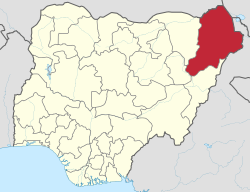
LANDMASS, LOCATION
Borno State has an area of 57,798.2 square kilometres.
It lies roughly at latitude 11°30’ North and longitude 13°00’ East.
HISTORY AND PEOPLE
The first settlers of Borno State were the Teda (Tibesti), Kanuri and Kanembu who lived around the state’s lake and rivers. These people were also called Sao. The Sefawa later displaced them in the fifteenth and sixteenth centuries.

Borno State has its roots in the move by the Saifawa rulers (Mais) of El Kanemi to the area west of Lake Chad in the fourteenth century. These people were referred to as the people from Bahr-el Nur; this name was later corrupted to Borno. It was under the Mais that the Kanuri emerged as a nation. The Fulani jihad of the nineteenth century weakened the authority of the Mais who were eventually displaced by Muhammed El-Amin lbn El-Kanemi, a Kanembu Islamic scholar who established the El-Kanemi dynasty, took the title of Shehu and transferred the capital to Kukawa. Rabeh, a Shuwa Arab, sacked much of Borno in 1893 and became its ruler, transferring the capital to Dikwa.
European colonisation in the last decade of the nineteenth century led to Rabeh’s defeat and the dismemberment of the Borno Empire. Following its division between the British and the French at the turn of the twentieth century, Borno State became part of Northern Nigeria. It was part of the Northern Region in the three-region structure of 1954 and part of North-Eastern State following the establishment of twelve federal states by General Yakubu Gowon’s military government. It was established as its own entity in 1976 following the dissolution of the North-Eastern State. The state’s borders were further adjusted when Yobe was excised from it in 1991.
Borno State is heterogeneous with twenty-eight (mostly Chadic) languages. The Shuwa Arabs, Kanuri and Marghi are the most represented people in the state and Kanuri is its dominant language. Other ethnic groups include the Hausa, Fulani and a number of tribes from southern Nigeria. Islam is the major religion in the state. There is a Christian minority concentrated around Maiduguri.
CULTURE
The people of Karai-Karai and two other tribes in Potiskum, Nangere and Fika local government areas mark the Barakau festival in June and September every year. During the festival, the people kill a cock of over one year old and splash its blood on the farm implements of each household.
Other cultural activities include the Durbar and Menwara festivals. The durbar festival is marked with display of horsemanship and reflects the state cultural diversity.
MAJOR TOWNS AND CITIES
Maiduguri (capital), Biu, Bama and Dikwa.
LOCAL GOVERNMENT AREAS

GOVERNORS
- Musa Usman (Governor– Military): May 1967 – July 1975
- Muhammadu Buhari (Governor– Military): July 1975 – March 1976
- Mustapha Amin (Governor – Military): March 1976 – July 1978
- Tunde Idiagbon (Governor– Military): July 1978 – October 1979
- Mohammed Goni (Governor – Civilian (Great Nigerian People’s Party)): October 1979 – October 1983
- Asheik Jarma (Governor – Civilian (Nigerian People’s Party)): October 1983 –December 1983
- Abubakar Waziri (Governor– Military): January 1984 – August 1985
- Abdulmumini Aminu (Governor – Military): August 1985 – December 1987
- Abdul One Mohammed (Governor – Military): December 1987 – December 1989
- Mohammed Maina (Governor – Military): December 1989 – June 1990
- Mohammed Marwa (Governor – Military): June 1990 – January 1992
- Maina Lawan (Governor – Civilian (Social Democratic Party)): January 1992 – November 1993
- Ibrahim Dada (Administrator – Military): December 1993 – August 1996
- Victor Ozodinobi (Administrator – Military): August 1996 May –1997
- Augustine Aniebo (Administrator – Military): May 1997 – August 1998
- Lawal Haruna (Administrator – Military): August 1998 – May 1999
- Mala Kachalla (Governor – Civilian (All People’s Party/; All Nigeria People’s Party)): May 1999 – May 2003
- Ali Sheriff (Governor – Civilian (All Nigeria People’s Party/People’s Democratic Party)): May 2003 – May 2011
- Kashim Shettima (Governor – Civilian (All Nigeria People’s Party)/All Progressive Congress): May 2011 – May 2019
- Babagana Zulum (Governor – Civilian (All Progressive Congress)): May 2019 – Present
ECONOMY
Borno State is primarily an agrarian society. The majority of the people are farmers, herdsmen and fishermen. There is also considerable local trade in sorghum, millet, corn (maize), rice, cotton and indigo.
The state is the most important livestock-producing area in Nigeria, an industry dominated by the Fulani and Shuwa. Livestock (mainly cattle with some goats and sheep), cattle hides, goatskins and sheepskins, finished leather products, dried fish, crocodile skins, groundnuts and gum arabic are all exported from Maiduguri.
Cattle rearing and poultry farming take place in the surrounding countryside, as does fishing along the shores of Lake Chad and the Yedseram river. Other local industries include cotton weaving, dyeing and the tanning of leather.

The mineral resources found in the state include clay, salt, potash, limestone, kaolin, sandstone, iron ore, uranium, quartz, magnesite, mica and granite.
EDUCATION
The tertiary institutions in the state are University of Maiduguri, Borno State University, Maiduguri, Ramat Polytechnic, Maiduguri, Sir Kashim College of Education, Waka Biu; Umar Ibn Ibrahim El Kanemi College of Education, Science and Technology, Bama; Mohammet Lawan College of Agriculture, Maiduguri; Mohammed Goni College of Legal and Islamic Studies, Borno College of Agriculture and the Federal Staff Training Centre, Maiduguri.
FAMOUS SITES
Chad Basin Natural Park, Chingurmi-Duguma

The park has three parts. In the Chingurmi-Duguma area of the park 66 species of birds have been recorded such as the black-crowned crane, African-collared dove among others.
The Bula Tura Oasis area is a number of swampy valley called oases and is home to some rare desert wildlife which include ostrich, glossy ibis, ratel, and mongoose.
The Bada Nguru Wetlands area has the Dagona Waterfowl Santuary. The sanctuary is significant as it is host to migrant European birds that flock there in the thousands every year as they escape Europe’s winter.
Biu Plateau, Biu

The Biu plateau contains a number of extinct volcanoes.
It is the source of many tributaries of the Gongola River. It has an average elevation of 2,300 feet and covers 5,200 square kilometres.
Do Rabeh’s Fort, Dikwa

Located in Dikwa town, Rabeh Fort is a 125-year-old monument that depicts the rich cultural heritage of the people of Borno State.
